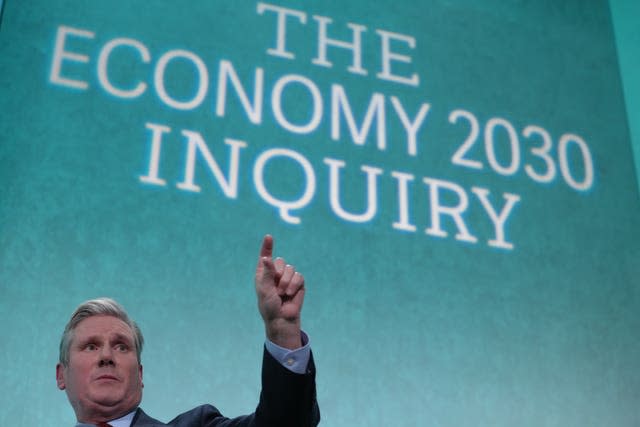Labour’s £28bn green plans subject to fiscal rules, says Starmer

Sir Keir Starmer has insisted that Labour’s scaled-back pledge to spend £28 billion a year on green initiatives would be subject to the party’s “fiscal rules”.
It comes as the Labour leader faced tough questions about his spending plans and priorities if the party wins the next election, avoiding answering directly questions about whether departments could face tough cuts if it comes to power.
Sir Keir on Monday appeared at the Resolution Foundation’s conference in central London with a speech which saw him stress that a Labour administration will not be able to “turn on the spending taps”.
The think tank report said the UK has seen 15 years of relative decline, with productivity growth at half the rate seen across other advanced economies and flatlining wages costing the average worker £10,700 a year in lost pay growth.
The Labour leader told the audience that the UK was “in a hole” and “going backwards” after 13 years of Tory rule.
He warned: “A political consensus that if you work hard and play by the rules, you will get on, a glue that binds British society together, has become nothing short of a lie – for millions.
“It’s a well from which so many political horrors can spring.”
The £28 billion initiative was not mentioned by Sir Keir in his speech and in a Q&A with The Economist chief editor Zanny Minton Beddoes he faced questions about whether the plan had been downgraded.
Labour had originally promised in 2021 to invest £28 billion a year until 2030 in green projects if it came to power. However, in June shadow chancellor Rachel Reeves said the figure would instead be a target to work towards in the second half of a first parliament.
The party denied reports last month it has been watered down yet again at the instance of Sir Keir.
“The £28 billion, we will ramp up to that in the second half of the Parliament,” he said on Monday.
“It will be used to trigger that other investment from the private sector and we’ll ramp up – it’s not a question of the investment not starting until the middle of the next Parliament.
“It is, of course, subject to our fiscal rules. But I am confident that if we turbocharge the growth that we need, we’ll be able to achieve the investment we need within the fiscal rules.”
Taking questions later from reporters, he stressed the fundamental importance of the fiscal rules.
The party’s rules include paying for day-to-day expenditure through tax receipts and getting debt down as a share of the economy.
“Those fiscal rules are the foundation upon which we build everything,” he said.

“They’re not a straitjacket for the £28 billion. There are foundational stone for everything that we should do.
He said he was “really confident that we can make the investment that we need to within our fiscal rules, because I’m confident that we’re doing the work on growth that we need to do”.
The speech on growth came after Chancellor Jeremy Hunt – who appeared at the same conference earlier – used his autumn statement to pencil in difficult cuts to public services in the years beyond 2024.
Sir Keir accused ministers of a “fiscal sleight of hand”, which “showed the Government is quite prepared to salt the earth of British prosperity, in pursuit of its political strategy”.
He also failed to say whether or not he could definitely rule out cuts under a Labour government, instead pointing to reform through the better use of things like AI and data.
“I do care about, I believe in, public services and I know a thing or two about the constraints of delivering public services, and I’m certainly not in the business of cutting the funding, which is why the focus is so much growth.
“What I would say, though, is that we must never forget that our public services need reform.
“We need to reform, we need to grow our economy. But the record of a Labour government is always to look after our public services.”
He also defended his decision to use an article in The Sunday Telegraph to praise the pro-privatisation former Tory prime minister Margaret Thatcher for having “set loose our natural entrepreneurialism”.
Sir Keir told reporters he was “distinguishing between particularly post-war leaders – those leaders, those prime ministers – who had a driving sense of purpose, ambition, a plan to deliver and those that drifted.”
“Now it doesn’t mean I agree with what she did but you don’t have to agree with someone to recognise they had a mission and a plan.”

 Yahoo News
Yahoo News 
